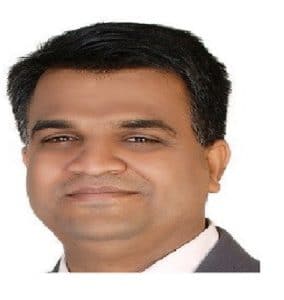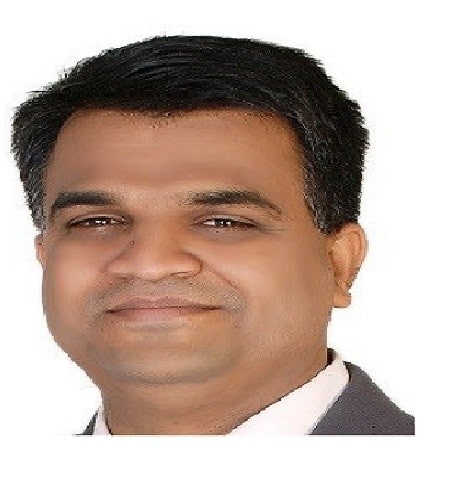Digital Dojo Pvt Ltd is an IoT Creator and Enabler serving Smart Education segment. It provides digital training platform as well as upskill and reskill corporate training program for companies on the journey of digital transformation using IoT.
As its USP, the company offers tactically designed courses on IoT to enable new workforce to embark on a digital journey to change themselves and the world.
By 2025, the company is targeting to empower at least 1 million+ students/ professionals with various digital skills like IoT, Digital Marketing, Automation, Machine Learning, Cognitive Computing and Blockchain technologies.
Sachin Sadare, Founder and Director, Digital Dojo Pvt Ltd, is an entrepreneur with excellent consulting, training, public speaking and negotiation skills. In an exclusive conversation with Electronicsforu, he talks about lack of quality talent in Indian IoT industry, growing industry-academia gap, internship program offered by Digital Dojo and many more…

Excerpts:
Q. Is ‘quality talent’ a challenge that IOT players are going to face in India?
‘Quality talent’ is amongst the most pressing issues for IoT players in India and worldwide. The knowledge, the solutions and the business models may all be in place but getting the right people to convert the idea into implementation still remains a big challenge for the industry.
The biggest pain I endure as an educator is – There are so many opportunities in IoT, yet many of the opportunities go waste. Many positions remain vacant for lack of the right candidate with the right IoT skills.
Another challenge faced by IoT industry is overemphasis on the skills acquired by candidates. Skills are highly over-rated in their resumes, creating valid doubts in the minds of IoT players. There is no assurance of the IoT skills acquired by the candidate.
Getting the candidate with the right IoT skills remains the biggest hurdle in the growth of Indian IoT industry.
Q. IOT is considered an amalgamation of electronics, datacom and IT. Out of these three–which one is going to be the main achilles heel for the IOT sector, in terms of ready availability of good talent pool?
It is true that IoT is an amalgamation of electronics, datacom and IT. And therein lays the Achilles heel for the IoT industry. What the industry needs is talent that can seamlessly interwork between these three areas.
Our education system, engineering syllabus or external skills development program do not address the interworking between different streams. We have been tuned to acknowledge ourselves as hardware, embedded, mechanical or software engineers. We need to adopt a new mindset of being termed ‘engineers’ or ‘solution providers’ that can work with electronics, mechanics, telecom and IT.
Q. What would be your advice to professionals working in electronics or IT sector and eyeing a role in the IOT space? Should they prepare themselves for making a switch? How?
IoT starts with the sensors but needs an intelligent implementation of the SMAC system (Social, Mobile, Analytics and Cloud) to bring real power to the IoT solutions. One needs to understand all the various aspects of an IoT solution really well to become a good IoT contributor. Even people, completely on the business side, need to understand the hardware and the software aspects of an IoT solution/ product they sell.
To those who are eyeing a switch, my advice will be to understand the foundations of IoT technology well. IoT careers need a mindset and behavioral change from the traditional technology roles. Half-baked knowledge will be a dangerous move.
Q. What would be your advice to the academia–how should they reinvent their curriculum to create techies suitable for the IOT industry?
I don’t think the academia has too many options in their arsenal. We are teaching the students the foundational engineering knowledge. We cannot just remove these subjects from the syllabus as they provide the base knowledge to apply the engineering advances.
Maybe there is a small scope to bring in a few new technology subjects into the curriculum. But the academia needs to ensure they have the right faculty to teach the new age subjects, else the move will only be a good move on paper.
However, I believe that the hands of the academia are tied, with respect to changes in the curriculum/ subjects taught. For the academia, curriculum is one of the least useful ways to address the industry-academia gaps that exist today. Academia has to look beyond curriculum changes, to bring a meaningful impact on the knowledge imparted.
Q. What steps can academic institutions take to bridge the industry-academia gap for the IOT sector?
With the ever-increasing technology advancements, the industry-academia gap keeps growing and will continue to grow. Industries, in many ways, have passed the buck of getting candidates digitally skilled – to students and academic institutions. Industry is no longer willing to spend money on training candidates like they used to do twenty years back. The gap is too huge to be filled up by the industry alone. Academic institutions, students and parents now need to step up if they wish to play an important role in the digital economy of the future.
We need a well-rounded ecosystem to bridge the industry-academia gap successfully. It includes meaningful final year projects, live industry assignments, minimum six months internships, etc. to be included within the four-year study period.
The industry-academia gaps are so huge that they can only be bridged by working with the industry by being inside it, and not just learning about it from outside. And this will need efforts and willingness from all the parties involved – industry, academia & students/ parents. This is a paradigm shift and we need to embrace it if we want to succeed in bridging the industry-academia gap for the IoT sector.
Q. Are you hiring or planning to hire talent for your IOT business? If yes, can you share estimated numbers to be hired within the next 2 years?
Digital Dojo Pvt. Ltd. is into the business of digital skills development/ training and digital consulting. Our hiring needs are limited but we will still hire a few graduates and senior business development guys for out IoT vertical. We are looking at anything around 5-7 hires in the next two to three years for our IoT vertical.
Q. If yes, what are the types of roles for which you’re planning to hire? Can you share brief idea about what these roles entail?
We will look at fresh graduates to build prototypes using sensors, programmable controllers, communication protocols, cloud systems, analytics software and mobile applications. This will be part of our consulting services to our clients.
On the business side, we will look at hiring senior IoT/ Digital professionals who can take our products/ offerings to the market with a clear understanding of business and technology needs of customers.
Q. Any key technology skill sets that you’re seeking amongst the would-be hires?
Python, R programming among the fresh hires and a sound technology/ business understanding for the senior professionals.
Q. Do you have a formal Internship programme to train freshers for the industry? If yes, can you share how’s it designed to actually make them industry-ready?
We do have a formal six-month internship program that trains students to enter the IoT industry with the right skills and confidence. As an added advantage to our interns, we make them all go through our online courses and certification process as part of the internship training.
We take the online certification process very seriously. Interns have to clear our exams within the first month to continue with us. We thus ensure that they contribute to our business, very early in their internship cycle, with the right knowledge & skill set. This also ensures that anyone who interns with us, can move into the IoT industry and start contributing from the first day.
Q. Can any student apply for your internship programme? If yes, how? If not, how do you select your interns?
Students can apply directly to our internship program from our website. We have a six-month internship program for students – either in their final year or after they have completed their engineering.
URL – https://digitaldojo.in/internship-program/
Q. Any unique hiring practice followed by your firm–to get the right candidates?
We first evaluate the attitude of the candidate. The most important question we try to answer is – “Does the candidate have the will to overcome challenges that will be faced?” If the basic knowledge is there, skills can be taught. Attitude is inbuilt.
Once we are sure of the attitude, we examine the cultural fit of the candidate with the existing team members. Due to our unique hiring criteria, we prefer to hire candidates from our pool of interns.
Sachin Sadare says –
- IoT careers need a mindset and behavioral change from the traditional technology roles
- We need to adopt a new mindset of being termed ‘engineers’ or ‘solution providers’ that can work with electronics, mechanics, telecom and IT.
- Academia must look beyond curriculum changes, to bring a meaningful impact on the knowledge imparted.
- We need a well-rounded ecosystem to bridge the industry-academia gap successfully.
- Academic institutions, students and parents now need to step up if they wish to play an important role in the digital economy of the future.








